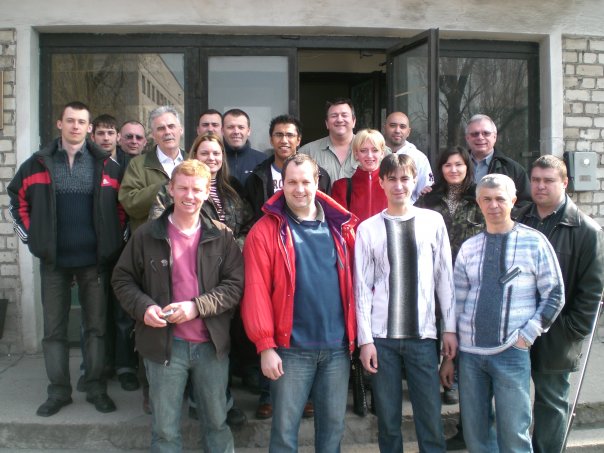September 7, 2014
Friends and Colleagues in Ukraine – 2007
My red-eye last night over the Atlantic from London to New York was not flight I wanted to catch, but due to lack of seats on earlier flights I booked it with an overnight stay in Newark before heading off to Dallas.
I was one of the first to board the plane and I was shocked at the small size of the aircraft, namely a Boeing 757-200. As I entered I could see the plane end-to-end. It had two rows of seats of three either side. The business class was tiny and I could see into the cockpit.
I walked down to Row 23 and took my aisle seat, which is my preferred seating. My wife Melissa loves the window seats, alas she was not travelling with me today. When I checked in online I saw that the window seat on my row was occupied and the middle seat was empty, so I was praying to the gods it remained so.
As the plane began filling up my travel companion came and sat down in the window seat. He looked flustered to say the least.
"I thought I was going to miss the flight," he looked at me and offered in an American accent.
"Where are you coming from?" I asked.
"Kiev, I had to run from the flight from Munich with only a 30 minute gap," he replied.
After he settled down I started conversing with him.
"Were you anywhere neat the fighting in the east?" I quizzed thinking he was some government or military personnel.
"No I was in the west around Lviv," he answered.
"Business or personal?" I asked further, beginning to sound like an interrogator.
"Aah! not business I am tracing my Ukrainian ancestors," He replied.
"Oh wow! that's brilliant, were you born there?" I questioned.
"No, no I am third generation born in the US," he offered.
He continued to tell me how his grandparents had emigrated to the US and Baltimore in the early twentieth century. He was trying to trace further back where his family came from and or went from outside Lviv.
"Where are you headed?" he asked me.
"I am off to Dallas," I replied.
"I love Dallas, but not the football team, Ravens are my team who play tomorrow. Are you on vacation?" He continued.
"Oh! I am not much of an American football l fan, soccer is my game," I responded
"And I am going home to see my wife,"
We continued to talk about Ukraine and I told him about my short work assignment in Kremenchuk, a mining city four hours south-east of Kiev.
He explained to me how he had traced 900 of his relatives from his grandparents villages outside Lviv. He was planning to reach 1500 and he had subscribed to Ancestry.com. He explained that as he was finding more relatives and lineage data he was updating Ancestry.com. He said that this trip was his first and now that he had made contacts he was going to be able to conduct his research from the US, without too much of a need to travel back to Ukraine.
We talked about Ukrainian cuisine, and I mentioned to him Borscht soup which he grew up on. Although the Borscht he grew up on was slightly different to the one dished up in Ukraine. I also talked about salo another Ukrainian dish that I remembered from my tenure out there. But most of all we talked about how much and how hard the Ukrainians drank their vodka or Horika. One brand I recalled seeing was Nemiroff which flashed a recognition in my companion's eyes.
He further explained to me how many of the villagers asked him, not in a demanding way but with sadness and sincerity, "Will Obama help us?"
He did not know what to say, because he knew it wasn't a yes. He dodged the question as best as possible without disheartening people too much.
I have a soft spot for Ukraine and it's people. My time out there was most enjoyable and memorable. I found the people to be very friendly and welcoming. I enjoyed International Women's Day weekend during 2007 in Kremenchuk, where eating, drinking and merriment was had by all. I further visited Kiev during May Day celebration that year and the city was alive to say the least.
My companion explained how his grandmother rued the day when in 1994 Ukraine signed the nuclear non-proliferation treaty and gave up its nuclear arsenal. I asked him why.
"Well, she said that it would leave Ukraine open to threats from other nations and especially the imperialist ambitions of Russia," he explained.
"And she was right, Russia is chipping away and taking Ukrainian land, where does it stop?"
"Yeah! I think the west has to make a stance and help Ukraine as much as they can. Diplomacy is the only way, we certainly don't want a full-scale war in Eastern Europe," I explained.
"I have a feeling nothing will happen and Obama will do nothing, because he does not know what to do," he replied.
"Russia could take in Kiev in weeks and Putin knows it, hence he is doing what he is doing," I offered.
We continued to make small talk as he showed me pictures of his family's village in Ukraine. He showed me cemeteries he visited to find ancestors. After being served dinner we both took to our private solace, he watched a movie and I listened to music.
I was happy to meet this man who had traveled to the land of his ancestors to trace his roots and in the face of adversity such as war. He was doing a commendable task of updating Ancestry.com for anyone from his family to be able to trace their lineage. He was in his own way recording history.
Our flight was pleasant and we landed just before 9pm in New York. We said our farewells as I took the line to the visitor immigration section.
"Enjoy the game tomorrow and I hope the Ravens win," I offered.
"Thank you and enjoy Dallas," he replied.
To all those people I came across in Kremenchuk, I wish them safety and well-being. I further wish the people of Ukraine a peaceful resolution to the current crisis.



